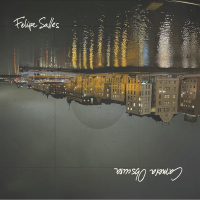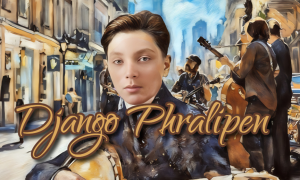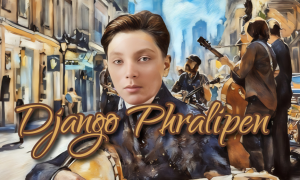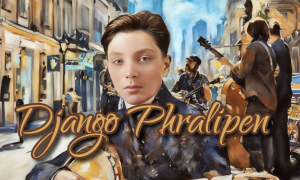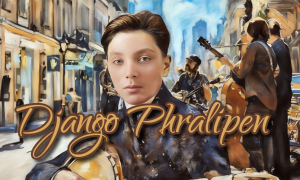Home » Jazz Articles » Django's Cosmic Echo » Chapter Five: The Brotherhood
Chapter Five: The Brotherhood
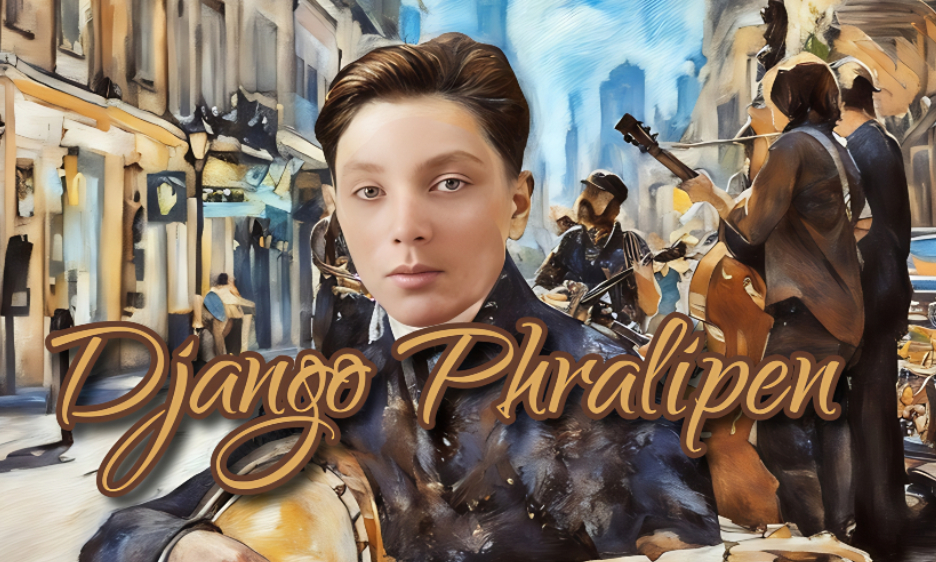
Courtesy AI
Chapters
1 | 2 | 3 | 4 | 5 | 6 | 7 | 8 | 9 | 10 | 11 | 12 | 13 | 14 | 15 | 16 | 17 | 18The year 1968 dawned over Amsterdam like a freshly painted psychedelic mural—vibrant, chaotic, and humming with a restless energy. Paradiso, the former church on Weteringschans, had finally thrown open its doors in March, instantly becoming the city's pulsating heart for music, happenings, and every shade of counter-culture. The chance to perform at this Mecca of counter-culture was like a waking dream for the teenage Django, although officially he was now twenty-one.
The trio of Django, Dave, and Lars had become a familiar fixture in smaller clubs and the more organized park gatherings. Django Phralipen's reputation was growing—the young guitarist with the impossible fingers and the ancient soul in his music. But Django felt a yearning for more. His musical mind, constantly absorbing and transmuting, was reaching for broader textures, more complex harmonies. The blues, the nascent rock, the free jazz he heard on records in Dirk's shop—it all swirled within him, seeking new outlets.
Dirk, ever observant, noticed. "You're outgrowing the trio format, aren't you, Django?" he remarked one afternoon, as Django worked through a particularly intricate, almost BartЁ®k-like passage on his Gibson in the back room of the shop. Django sighed. "There are sounds in my head, Dirk. More colours. Dave is a rock & soul, Lars has the perfect heartbeat, but... I hear other voices."
The opportunity came, as it often does, through a chance encounter. Dave, ever the social butterfly, had struck up a conversation with a couple of students from the Amsterdam Conservatory of Music who were regulars at "De Kater," a small, smoky cafЁҰ-club where the trio had a regular late morning slot, playing to a mix of early risers, students cutting class, and off-duty artists. They were, Dave reported with enthusiasm, "a bit bonkers, but brilliant."
Leo, the bassist, was a tall, lanky Dutchman with a serious expression that belied a dry wit and a surprisingly adventurous musical palate. He wielded an electric bass with a fluid, melodic style that owed as much to jazz as it did to the burgeoning rock scene. Stefan, the mandolin player, was a wiry, intense young man of German-Dutch parentage, his fingers a blur on the tiny fretboard. He was steeped in classical discipline but was increasingly drawn to folk traditions and the improvisational freedom of jazz. They were trying to form a band, something that fused their love for complex arrangements, improvisation, and a heavier, rock-inflected sound—"progressive," they called it.
Dave invited them to sit in during their next set at De Kater. The space was cramped, the air already thick with coffee, stale beer, and cigarette smoke despite the hour. Leo plugged his bass into a battered house amp, Stefan cradled his mandolin, his brow furrowed in concentration. At first, it was tentative. Django led them through a familiar Manouche tune. Leo, accustomed to more conventional chord changes, initially struggled to lock into the pompe rhythm, while Stefan's classically trained ear tried to find a pre-written harmony.
Then Django, sensing their unease, shifted gears. He started a simple blues riff, then began to twist it, injecting unexpected chromatic runs and syncopations. Leo's eyes widened; he picked up the mutated riff, grounding it with a sinuous bass line that wove around Django's melody. Dave, ever adaptable, laid down a solid, slightly heavier rhythmic bed. Lars, with his brushes, found subtle accents, then switched to sticks, adding a crisp backbeat.
Stefan watched, listened, and then, slowly, began to play. His mandolin didn't try to mimic Django's guitar; instead, it added shimmering arpeggios, counter-melodies that soared and dived, sometimes harmonizing in haunting, almost medieval modes, sometimes cutting across the rhythm with sharp, percussive chops. For the rest of their set, they played. They deconstructed Beatles tunes, took

Miles Davis
trumpet1926 - 1991
When they finally crashed to a halt, breathless and grinning, the small club erupted in surprised, enthusiastic applause. Dirk, who had slipped in to listen, simply said from his corner table, "Well. That was something." "It was... an alchemy," Stefan breathed, his eyes shining. Leo nodded, a rare, wide smile on his face. "The structures, the freedom... it works."
That afternoon, gathered in Dirk's shop, the five of them excitedly discussed possibilities. "We need a name," Dave said. "Django Phralipen... and... ?" Leo mused, looking around at the eclectic group. Django thought for a moment, the meaning of his chosen Romani surname echoing in his mind. "Phralipen," he said softly. "It means brotherhood, fellowship." He looked at the faces around him—Dave, his first friend in this new world; Lars, the steady heartbeat; Leo and Stefan, the brilliant conservatory students who had embraced his music so readily. "We are... a kind of brotherhood, no? Forging something new together." A slow smile spread across Dave's face. "The Django Phralipen Brotherhood." Stefan nodded, a spark in his eye. "I like it. It has depth. It speaks to the music." Leo, ever practical but clearly intrigued, agreed. "It has a weight to it. The Django Phralipen Brotherhood. Yes." And so, the name was set.
Rehearsals as "The Django Phralipen Brotherhood" were intense, a joyful collision of musical worlds. Django taught them the nuances of Manouche swing; they, in turn, introduced him to modal jazz, intricate rock arrangements, and the power of electric amplification. His compositions became richer, more ambitious, filled with unexpected shifts in tempo and harmony, yet always anchored by that undeniable, infectious swing and his soaring improvisations. The name itself seemed to inspire a deeper connection between them, a sense of shared musical destiny.
Their first few gigs as a quintet in smaller venues created an immediate buzz. People hadn't heard anything quite like it—the sophistication of jazz, the raw energy of rock, the timeless soul of gypsy music, and the unexpected texture of the mandolin, all fused into a compelling whole under the banner of The Django Phralipen Brotherhood. The word spread through Amsterdam's tightly knit music scene: something new, something vital, was happening.
Dirk, using his contacts, managed to get a demo tape—a rough recording made in his back room—into the hands of one of Paradiso's bookers. A week later, the call came. Paradiso offered them an opening slot for a popular British rock band.
The night of the gig, the vast, high-ceilinged space of the former church was packed. The air was thick with anticipation and the sweet scent of patchouli and weed. Backstage, Django felt a familiar tremor of nerves, but this time it was overlaid with a thrilling excitement. He looked at his bandmates—his Brotherhood—Dave, solid and grinning; Lars, calmly tapping a rhythm on his knee; Leo, tuning his bass with intense focus; Stefan, eyes closed, mentally running through their most complex arrangements.
"Ready, Brotherhood?" Django asked, his voice quiet but firm. They nodded, a collective surge of adrenaline passing between them. They walked onto the iconic stage, the lights hitting them, the roar of the crowd washing over them. Django plugged in his Gibson, caught Dirk's encouraging nod from the shadows, and struck the first chord.
What followed was pure magic. Their sound, honed in tiny clubs and Dirk's dusty back room, filled the cavernous space of Paradiso. They opened with a Django original, a piece that started with a haunting mandolin and bass duet, built into a furious gypsy-rock stomp, then dissolved into a lyrical guitar solo that had the crowd mesmerized. They were tight, adventurous, and utterly unique. The audience, initially there for the headliners, was captivated. By the end of their forty-five-minute set, Paradiso was on its feet, roaring its approval for The Django Phralipen Brotherhood.
As they walked off stage, soaked in sweat and grinning triumphantly, Django knew this was just the beginning. The Django Phralipen Brotherhood had arrived. And Paradiso, the temple of Amsterdam's new sound, had welcomed them with open arms.
Story by Alan Bryson, edited and assisted by AI.
Disclaimer: This is a fictional account exploring what might have happened if a temporal quantum event had occurred. While real musicians and historical figures appear within these pages, they exist here in an alternate timeline—a reality that quantum theory suggests was possible, but that never came to pass. All interactions, conversations, and events involving these individuals are entirely fictional, products of a world that exists only in the space between what was and what might have been.
Tags
Comments
PREVIOUS / NEXT
Support All About Jazz
 All About Jazz has been a pillar of jazz since 1995, championing it as an art form and, more importantly, supporting the musicians who make it. Our enduring commitment has made "AAJ" one of the most culturally important websites of its kind, read by hundreds of thousands of fans, musicians and industry figures every month.
All About Jazz has been a pillar of jazz since 1995, championing it as an art form and, more importantly, supporting the musicians who make it. Our enduring commitment has made "AAJ" one of the most culturally important websites of its kind, read by hundreds of thousands of fans, musicians and industry figures every month.



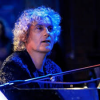
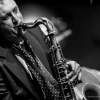

 Buy Now
Buy Now





